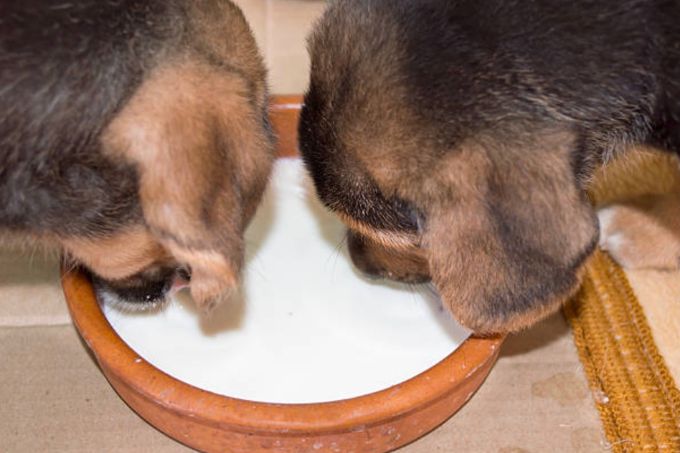This post may contain affiliate links, which means we may receive a commission from purchases made through these links. See our affiliate disclaimer.

Milk is delicious and refreshing, inexpensive and readily available. A bowl of milk sounds like the perfect treat for dogs! But wait, can dogs drink milk?
The short answer: milk is not toxic for dogs, but is commonly associated with allergies and lactose intolerance. You can give your dog dairy milk or plant-based milk occasionally & in small quantities without problem.
Read on to learn some common problems adult dogs experience with milk, what signs to watch out for, and a tip for using milk wisely!
Can dogs drink milk?
All of the types of milk you find at your local grocery — dairy milk and plant-based ones — are not toxic to dogs. You can give your dog 2-3 tablespoons of the stuff occasionally without causing any problems. Many of them are excellent sources of calcium, potassium and vitamins.
However, if you are planning to give your dog any type of milk regularly, there are 2 potential problems to watch out for: allergies and lactose intolerance, both commonly associated with these milks.
Not all dogs will have allergies to milk or be intolerant of lactose, and those that do will have them in varying degrees. Some dogs might have a gassy stomach for one afternoon, while others might have persistent diarrhea for a day or two. Yet other dogs might have more serious reactions, so there is an important observation period when introducing milk into your dog’s diet. We go into further detail below.
If you notice any signs of allergies to milk or lactose intolerance in your dog, stop giving them milk. Consult your veterinarian immediately for moderate to severe reactions.
Allergies
Dairy products, including milk, are a very common allergen in dogs. Plant-based milks contain the same proteins that can trigger allergic reactions. Here are some common signs of an allergic reaction in dogs to watch out for:
Allergic reactions usually occur within minutes of encountering an allergen, but can also occur up to hours later. Allergic reactions don’t occur upon first contact with an allergen, i.e. the first time your dog drinks milk; they occur upon second or later instances of contact. So make sure you observe your dog the first few times he has any new milk.
Lactose intolerance
Just like humans, dogs develop lactose intolerance later on in life. As puppies they’re able to drink their mother’s milk, and as they age they become intolerant of the sugar (lactose) found in traditional milks. The following are common signs of lactose intolerance in dogs:
The smellier-than-usual farts start about 2-3 hours after ingesting milk, while the diarrhea can start up to 12 hours later.
If your dog drinks a lot of milk, it might be difficult to tell if he’s lactose-intolerant or not. A large volume of milk can trigger similar reactions even in dogs that aren’t lactose-intolerant.
What kind of milk is best for dogs?
All types of milk carry the risk of weight gain if not given in moderation. Milk is unique in that it’s high in fat and calories, yet doesn’t give you that sense of fullness that solid foods do.
You want to find a reduced-fat milk with little to no added sugar, and even then only give some to your dog sparingly.
Can I give my dog almond milk or oat milk?
Yes! Almond milk, oat milk, soy milk, coconut milk — all plant-based milks are safe for dogs in small amounts.
These lactose-free milks won’t trigger the common symptoms of lactose intolerance in your dog, but may still cause allergic reactions. They also carry the same risk of weight gain.
Can I give my dog flavored milk?
Most types of flavored milks, such as strawberry or vanilla milk, have higher fat content and more calories than unflavored milk. Some of them also contain xylitol as a sweetener, which is toxic to dogs even in small quantities. We recommend avoiding this type of milk altogether.
Do not give your dog any type of chocolate-flavored milk; chocolate is toxic to dogs.
How much milk can I give my dog?
We recommend only 2-3 tablespoons (30-45 ml) at a time.
If you intend to use milk to make your dog’s meals more palatable, we recommend mixing the milk in with water at a 1:1 dilution. That should be enough liquid to make his dry kibble easier to swallow.
What other dairy products are safe for dogs?
Cheese, yogurt, ice cream — all dairy products are safe for dogs if given sparingly and occasionally. These products are low in lactose and are unlikely to cause symptoms of lactose intolerance in small quantities.
Just a word of caution for ice cream: make sure to check the label for any trace of xylitol or chocolate before giving your dog any!
Great! Now that you know all there is to know about milk, how about checking out our picks for best dog milk?

